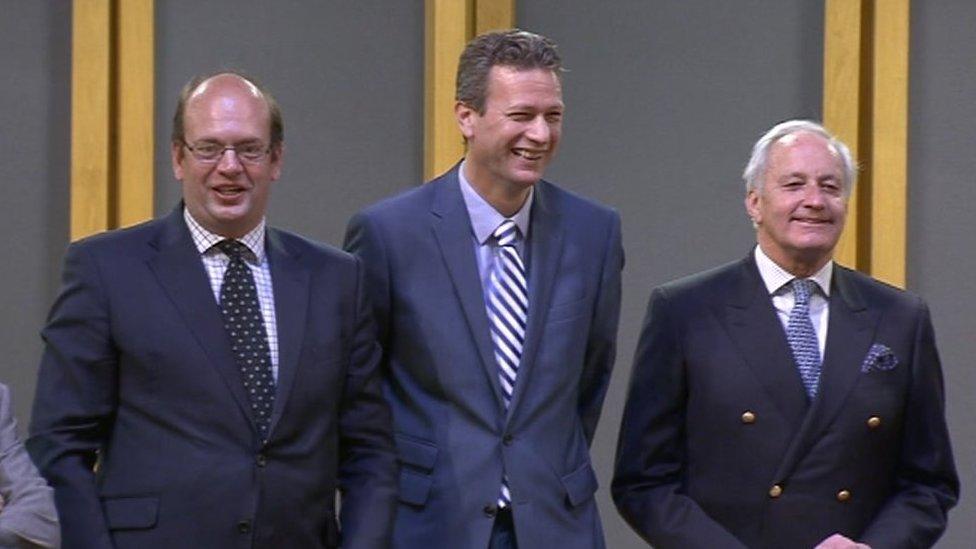General election: Expert view on UKIP in Wales
- Published

Mark Reckless (left) and Nathan Gill (centre) have both left the UKIP group led by Neil Hamilton (right)
Nye Davies from Cardiff University's Wales Governance Centre assesses the prospects for UKIP at the general election.
If the latest polling data is anything to go by then we are about to witness one of the quickest declines a political party has faced in recent times. In the 2016 Welsh Assembly election UKIP won 12.5% of the constituency vote and 13% of the regional vote. For the upcoming election, polling data from the Wales Governance Centre puts UKIP on 5%. This is an 8% drop from opinion polls in January, a remarkable decline in such a short amount of time.
With UKIP voters seemingly moving in their droves to the Conservatives as Theresa May asks for a "strong hand" in Brexit negotiations, it is difficult to see what the party can offer. UKIP's entire purpose has been to campaign for the UK to leave the EU - now that this is happening, what else does the party offer? How will the party approach the upcoming general election, particularly in Wales? There have already been reports that UKIP is not standing candidates against pro-Brexit Tories. In fact, UKIP is fielding candidates in only 377 seats and 32 out of 40 seats in Wales - this is significant as the party fielded candidates in all 40 seats in 2015. This has been put down to the timing of the election and the costs involved with fielding candidates.
Despite this, according to UKIP's assembly group leader Neil Hamilton, voters need to vote UKIP in order to ensure Brexit is delivered. Speaking to BBC Radio Wales recently, he accused Theresa May of being a "tepid" Remainer and argued that she would not be able to control immigration as prime minister even if the UK left the EU, citing her previous record on immigration from outside the EU while home secretary as evidence of this.
In terms of any particular Welsh strategy, a search through UKIP's social media sites reveals that there isn't any. Most of the election campaign material posted is simply reposted from the central UKIP accounts. Perhaps it might be expected that the party in Wales would make more of the fact that it actually has five members of the Welsh Assembly - more than the Lib Dems. However, this is the Brexit election - Mr Hamilton himself has posited the vote on 8 June as "a bit of a referendum in itself on the Brexit process". UKIP will hope that it still has a chance to push its core message regarding Brexit and the EU, but it is likely to get lost in the noise of Corbyn vs May.
Another indicator that pushing its record in Wales will be unhelpful is the results from the latest Welsh Political Barometer poll. Respondents were asked to rate all the UK and Welsh party leaders - Neil Hamilton averaged only two out of 10. My Wales Governance Centre colleague Prof Roger Scully recently stated that he was "not aware of any party leader, anywhere, that has ever scored as badly on a similar question. Even among those who voted UKIP in 2015, [Mr] Hamilton fails to average as high as three out of 10". It seems as though the increased visibility of Neil Hamilton since he became leader of UKIP in Wales has had a detrimental effect.
This election may prove to be very difficult for UKIP. As many figures in the party have noted, it has come at an inopportune time. After the UK voted to leave the EU, there is a serious question as to what the role of UKIP is to be over the next few years. Notable figures have already left, such as Mark Reckless in the assembly and Douglas Carswell at Westminster. If the party is struggling to keep hold of politicians, it will also have difficulty trying to keep hold of voters. UKIP's economic spokesman Patrick O'Flynn argued that in light of the vote for Brexit, UKIP had become "the most successful pressure group of the entire 21st Century". With UKIP's raison d'etre being diminished post-Brexit, minority party status is likely to be where it is heading.